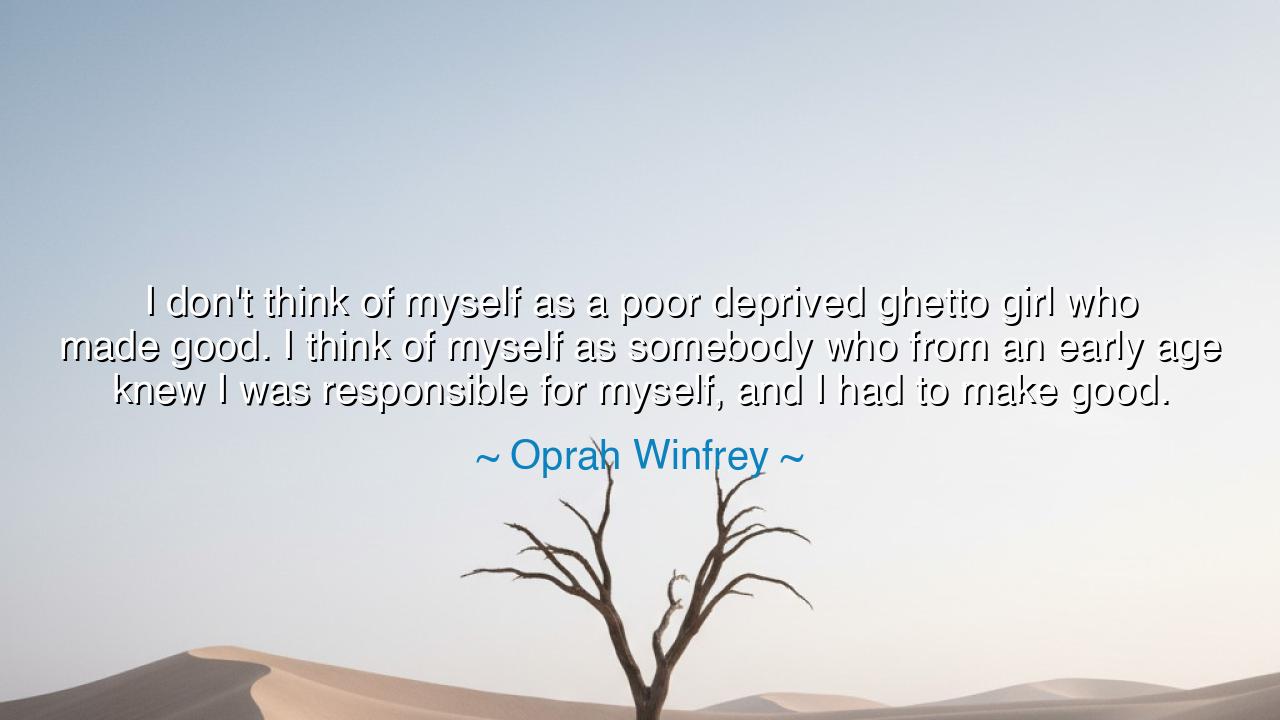
I don't think of myself as a poor deprived ghetto girl who made
I don't think of myself as a poor deprived ghetto girl who made good. I think of myself as somebody who from an early age knew I was responsible for myself, and I had to make good.






The radiant Oprah Winfrey, whose life has become a parable of transformation and triumph, once declared: “I don’t think of myself as a poor deprived ghetto girl who made good. I think of myself as somebody who from an early age knew I was responsible for myself, and I had to make good.” In these words lies a power far deeper than success or fame — it is the declaration of a soul that has claimed sovereignty over its own destiny. She does not bow before circumstance or pity; she stands as the architect of her own becoming. This quote is not merely about ambition, but about self-responsibility, the sacred recognition that one’s life is not shaped by what happens to us, but by what we choose to do with it.
The origin of this quote is rooted in Oprah’s own story — a journey from the fields of Mississippi poverty to the summit of global influence. Born into hardship, raised in an environment marked by both love and pain, she could have accepted the narrative the world wrote for her — that she was poor, deprived, and powerless. But instead, she rewrote her own story. From a young age, she understood that no savior was coming, no rescue awaited. The strength she sought would have to come from within. That early awakening — that realization that “I was responsible for myself” — became the foundation of her life. It is this inner authority, this refusal to be defined by limitation, that made her not merely successful, but truly free.
There is profound wisdom in her words, for they remind us of an ancient truth: that the greatest victory is the mastery of the self. Fortune and circumstance are transient, but character endures. In every age, the powerful and the wise have known that the first step toward greatness is self-command. Consider the example of Marcus Aurelius, the philosopher-emperor of Rome. Surrounded by privilege, burdened by empire, and beset by chaos, he wrote in his meditations: “You have power over your mind — not outside events. Realize this, and you will find strength.” Like Oprah, he understood that while the world may wound, it cannot define. Responsibility for one’s soul — this is the measure of true sovereignty.
Oprah’s statement also challenges the modern temptation to define ourselves by our wounds. The world often glorifies the narrative of the victim, celebrating survival without honoring agency. But she reminds us that victory lies not in survival alone, but in transformation. She does not deny her origins; rather, she transcends them. By refusing to call herself “deprived,” she refuses to let deprivation be the lens through which her life is seen. This is a lesson for all who carry the weight of past suffering: you may not be responsible for your pain, but you are responsible for what you become because of it. To see oneself as a creator rather than a casualty — that is the beginning of freedom.
Her words echo across history in the stories of those who rose above their beginnings. Think of Frederick Douglass, born into slavery, who taught himself to read by stealing scraps of knowledge and went on to become one of the greatest orators of his time. He once said, “I prayed for freedom for twenty years, but received no answer until I prayed with my legs.” Like Oprah, he understood that liberation begins not in circumstance, but in conviction. Both voices — one of the nineteenth century, one of the twentieth — speak the same eternal truth: that self-determination is the essence of human dignity.
The meaning of Oprah’s message, therefore, is not limited to her life alone. It is a call to all who doubt their worth, who wait for validation from the world. She teaches that the moment you claim responsibility for your life, you awaken the divine power that has been sleeping within you. It is not arrogance, but awareness. The universe favors those who act with purpose, who refuse to be victims of chance. To say “I am responsible for myself” is to take hold of your destiny with both hands — to become the sculptor rather than the clay.
The lesson, then, is both simple and profound: you are not what has happened to you; you are what you choose to become. Life will offer hardship and injustice, but these are not verdicts — they are invitations to rise. Begin by taking ownership of your thoughts, your habits, your vision. Do not speak of your limitations as though they were eternal truths. Speak instead of what you are building, what you are becoming. For the act of self-responsibility is itself an act of creation — a quiet revolution that turns suffering into strength.
Thus remember, O seeker of greatness, that no destiny is written in the stars without your consent. The world may label you, wound you, even forget you — but if you stand in the truth of your own agency, you cannot be conquered. Let Oprah’s words be your compass: do not think of yourself as deprived, but as responsible; not as broken, but as becoming. For the greatest miracle is not that one escapes adversity, but that one learns to use it as the fire that forges the soul.






AAdministratorAdministrator
Welcome, honored guests. Please leave a comment, we will respond soon